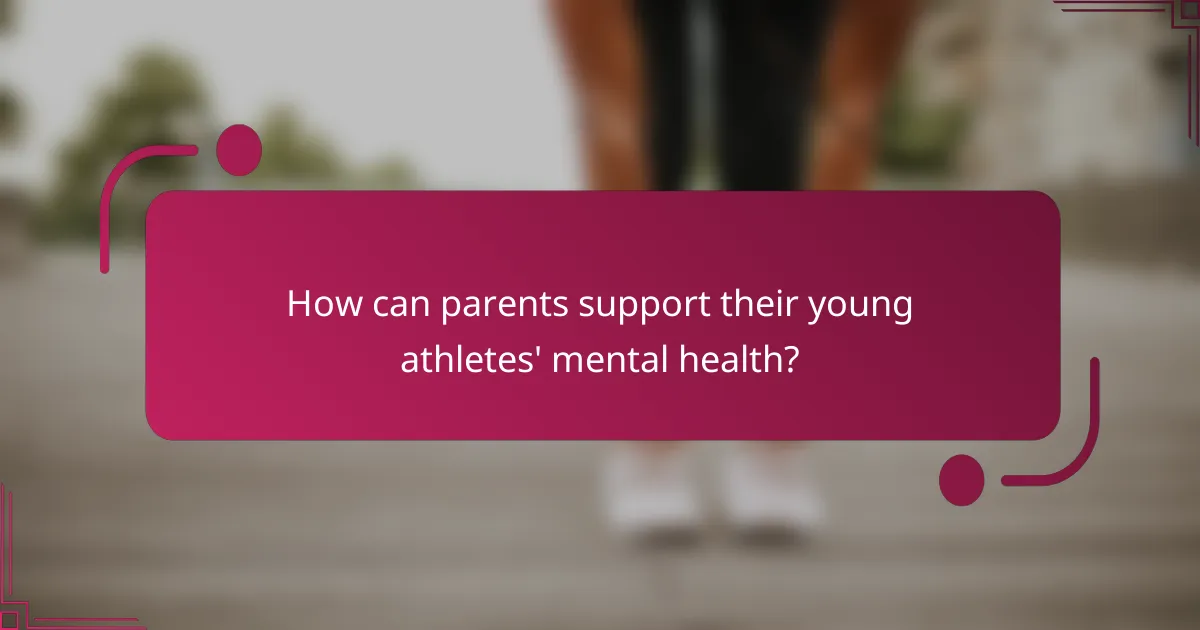Young athletes can significantly improve their performance and well-being by implementing effective mental health strategies. These include building a strong support network, practicing mindfulness, setting realistic goals, and maintaining a balanced routine. Addressing challenges like performance anxiety and burnout is crucial for their mental resilience. Engaging parents and coaches in fostering a positive environment further enhances their overall mental health.

What are the key mental health strategies for young athletes?
Young athletes can enhance their performance and well-being through key mental health strategies. These strategies include establishing a strong support network, practicing mindfulness and relaxation techniques, setting realistic goals, and maintaining a balanced routine that prioritises both training and rest.
A strong support network provides emotional stability and encouragement, which is vital for young athletes facing pressures. Mindfulness practices, such as meditation, help improve focus and reduce anxiety. Setting realistic goals fosters motivation and a sense of achievement, while a balanced routine ensures physical training does not compromise mental health.
Incorporating these strategies can lead to improved resilience and overall mental well-being, which are essential for sustained athletic performance.
How does physical activity influence mental health in young athletes?
Physical activity significantly enhances mental health in young athletes by reducing anxiety and improving mood. Regular exercise promotes the release of endorphins, which can lead to increased feelings of happiness and well-being.
Engaging in team sports fosters social connections, offering support networks that contribute to emotional resilience. This environment helps young athletes build self-esteem through skill development and achievement.
Moreover, physical activity can improve focus and cognitive function, positively impacting academic performance. Studies indicate that active youth report lower levels of depression and stress, underscoring the importance of incorporating regular exercise into their routines.
In summary, the interplay between physical activity and mental health in young athletes is crucial for their overall performance and well-being.
What role does nutrition play in mental well-being for athletes?
Nutrition plays a crucial role in enhancing mental well-being for athletes. Proper nutrition supports cognitive function, reduces stress, and improves mood, all of which are vital for optimal performance.
A balanced diet rich in essential nutrients, such as omega-3 fatty acids, antioxidants, and vitamins, can significantly impact mental health. For instance, omega-3s found in fish are linked to reduced anxiety and depression levels.
Hydration is another key factor. Dehydration can lead to fatigue and decreased concentration, negatively affecting performance. Athletes should aim to maintain adequate fluid levels throughout the day.
Incorporating complex carbohydrates can also stabilise blood sugar levels, promoting sustained energy and focus. This nutritional strategy helps athletes manage stress and enhances their overall mental resilience during training and competition.

What are the universal challenges young athletes face regarding mental health?
Young athletes face significant mental health challenges, including anxiety, pressure to perform, and social isolation. These factors can negatively impact their performance and overall well-being.
Anxiety often arises from high expectations, whether self-imposed or from coaches and parents. This pressure can lead to burnout and decreased motivation. Social isolation may occur as athletes prioritise training over friendships, leading to feelings of loneliness.
Developing mental health strategies is essential. Techniques such as mindfulness, stress management, and open communication can help athletes cope with these challenges. Encouraging a supportive environment fosters resilience and promotes mental well-being.
How does competition pressure affect young athletes’ mental health?
Competition pressure can negatively impact young athletes’ mental health by increasing stress and anxiety. This pressure often leads to burnout and decreased enjoyment in sports. Strategies to mitigate these effects include fostering a supportive environment, encouraging open communication, and promoting a balanced approach to competition. Research shows that 70% of young athletes experience performance-related stress, highlighting the need for effective mental health strategies. Implementing mindfulness techniques and emphasising personal growth over winning can enhance well-being and performance.
What are common signs of mental health issues in young athletes?
Common signs of mental health issues in young athletes include mood swings, withdrawal from social activities, changes in sleep patterns, and declining performance. These symptoms can indicate anxiety, depression, or stress. Early identification is crucial for effective intervention and support.

What unique mental health strategies can enhance performance in young athletes?
Mental health strategies can significantly enhance performance in young athletes by promoting resilience and focus. Techniques such as mindfulness training, cognitive behavioural strategies, and positive self-talk can improve mental clarity and reduce anxiety. Incorporating regular mental skills training sessions can lead to better emotional regulation and increased motivation. Additionally, fostering a supportive environment with open communication enhances athletes’ confidence and overall well-being.
How can goal-setting improve mental resilience in young athletes?
Goal-setting enhances mental resilience in young athletes by providing clear objectives and a sense of purpose. This process fosters motivation and helps athletes manage stress effectively. Setting specific, measurable, attainable, relevant, and time-bound (SMART) goals can lead to improved focus and confidence. Research indicates that athletes who engage in goal-setting demonstrate greater persistence and adaptability in challenging situations. This strategy contributes to overall mental health, promoting well-being and performance.
What are effective techniques for setting achievable goals?
Effective techniques for setting achievable goals include using the SMART criteria, breaking goals into smaller tasks, and regularly reviewing progress. SMART goals are specific, measurable, achievable, relevant, and time-bound, ensuring clarity and focus. Breaking larger objectives into manageable tasks prevents overwhelm and promotes steady progress. Regular reviews help young athletes adjust their strategies and maintain motivation, enhancing both performance and well-being.
What role does team support play in mental health for young athletes?
Team support significantly enhances mental health for young athletes by providing emotional stability and fostering a sense of belonging. Supportive teammates and coaches contribute to reduced anxiety and improved self-esteem. Research indicates that athletes with strong social connections experience lower stress levels, which positively impacts performance and overall well-being. Additionally, team dynamics can encourage open discussions about mental health, creating a culture of understanding and resilience.

What rare mental health challenges do young athletes encounter?
Young athletes encounter rare mental health challenges such as performance anxiety, identity issues, and burnout. These challenges can stem from intense competition and pressure to succeed.
Performance anxiety manifests as overwhelming fear of failure, affecting focus and confidence. Identity issues arise when athletes struggle to balance sports with personal life, leading to a loss of self outside their sport. Burnout, characterised by emotional exhaustion and decreased motivation, can occur due to relentless training schedules and high expectations.
Addressing these challenges requires tailored mental health strategies. Techniques such as mindfulness, cognitive-behavioural therapy, and open communication with coaches can enhance well-being and performance. A supportive environment is crucial for young athletes to thrive mentally and physically.
How can the stigma surrounding mental health impact young athletes?
The stigma surrounding mental health can severely impact young athletes’ performance and well-being. It may lead to feelings of isolation, anxiety, and reluctance to seek help. As a result, athletes might underperform and struggle with their mental health, affecting their overall sports experience. Studies indicate that 35% of young athletes experience mental health issues, yet many do not receive appropriate support due to stigma. Encouraging open conversations about mental health can foster a supportive environment, helping athletes thrive both on and off the field.
What unique stressors do young athletes face in elite sports?
Young athletes in elite sports face unique stressors such as high performance expectations, intense competition, and limited social lives. These pressures can lead to anxiety and burnout. Additionally, the fear of injury and the need for constant improvement can further impact their mental health. Effective mental health strategies include mindfulness, open communication with coaches, and establishing a support network. These approaches can enhance both performance and overall well-being.

How can parents support their young athletes’ mental health?
Parents can support their young athletes’ mental health by fostering a positive environment and encouraging open communication. Establish routines that prioritise mental well-being alongside physical training. For example, integrate relaxation techniques such as mindfulness or deep breathing exercises into practice sessions.
Promote a growth mindset by emphasising effort over results. This approach helps young athletes view challenges as opportunities for development. Encourage them to set realistic goals, which can enhance their sense of achievement and motivation.
Regularly check in on their emotional state and provide reassurance. Listening actively to their concerns can significantly impact their mental resilience. Additionally, involve them in discussions about balancing sports with other life aspects, such as academics and social activities.
Lastly, consider professional support when needed. Mental health professionals can offer tailored strategies for coping with stress and anxiety related to sports. This proactive approach ensures young athletes maintain a healthy relationship with their sport and overall well-being.
What communication strategies are effective for discussing mental health?
Effective communication strategies for discussing mental health with young athletes include active listening, fostering a safe environment, and using relatable language. These approaches encourage open dialogue and trust.
Active listening involves fully engaging with the athlete, showing empathy, and validating their feelings. Creating a safe environment allows athletes to express their concerns without fear of judgment. Using relatable language ensures the conversation resonates with their experiences, making it easier for them to engage.
Additionally, incorporating regular check-ins can help monitor mental well-being and performance. This proactive approach not only addresses issues early but also reinforces the importance of mental health in athletic success.
How can parents recognize when their athlete needs help?
Parents can recognize when their athlete needs help by observing changes in behaviour, mood, and performance. Signs include increased anxiety, withdrawal from activities, and declining interest in sports. Frequent physical complaints and difficulty concentrating are also indicators. Open communication fosters trust, allowing athletes to express struggles.

What are the best practices for coaches in supporting young athletes’ mental health?
Coaches can significantly enhance young athletes’ mental health by implementing supportive strategies. Prioritise open communication to foster trust and understanding. Encourage a balanced approach to competition, emphasising personal growth over winning. Implement regular mental health check-ins to identify stressors early. Promote a positive team culture that values respect and inclusivity, which can enhance athletes’ emotional resilience.
How can coaches create a positive environment for mental well-being?
Coaches can create a positive environment for mental well-being by fostering open communication and support. Encouraging athletes to express their feelings enhances trust and reduces anxiety. Implementing team-building activities strengthens relationships, promoting a sense of belonging. Regular feedback helps athletes feel valued, boosting their confidence. Additionally, integrating mindfulness practices can improve focus and resilience, positively impacting performance and overall mental health.
What training should coaches undergo to better support mental health?
Coaches should undergo training in mental health awareness, communication skills, and psychological strategies. This training enhances their ability to support young athletes effectively. Programs focusing on resilience building, stress management, and emotional intelligence can significantly improve athletes’ performance and well-being. Regular workshops and certifications can help coaches stay updated on best practices in mental health support.

What are the most common mistakes to avoid in supporting young athletes’ mental health?
To support young athletes’ mental health effectively, avoid common mistakes that hinder their performance and well-being. Prioritise open communication, ensuring athletes feel safe expressing concerns. Avoid placing excessive pressure on performance, which can lead to anxiety. Encourage a balanced lifestyle that includes rest and social activities. Recognise signs of mental distress early, and provide access to professional support when needed. Lastly, foster a positive environment that celebrates effort, not just outcomes.
How can miscommunication affect young athletes’ mental well-being?
Miscommunication can significantly harm young athletes’ mental well-being by fostering anxiety and reducing confidence. Clear communication enhances understanding and trust among teammates and coaches, leading to improved performance. Conversely, misunderstandings can create feelings of isolation and frustration. Research shows that effective communication strategies can mitigate these negative impacts, promoting a supportive environment that nurtures mental health and resilience.
What pitfalls should coaches and parents be aware of when addressing mental health?
Coaches and parents should avoid minimising young athletes’ feelings, focusing solely on performance, and neglecting open communication. These pitfalls can hinder mental health and overall well-being. Prioritising emotional support and fostering a safe environment enhances athletes’ resilience and performance.

What actionable tips can young athletes implement for better mental health?
Young athletes can enhance their mental health by practicing mindfulness, maintaining a balanced routine, and fostering supportive relationships. These strategies contribute significantly to performance and overall well-being.
Mindfulness techniques, such as meditation and deep breathing, help athletes manage stress and improve focus. Regular physical activity combined with adequate rest promotes mental clarity and emotional stability. Building strong relationships with coaches, teammates, and family provides essential support, encouraging open communication about feelings and challenges.
Setting realistic goals fosters a sense of achievement, while engaging in enjoyable activities outside of sports can prevent burnout. Finally, seeking professional help when needed ensures that mental health remains a priority, enabling young athletes to thrive both on and off the field.
How can athletes build a personal mental health toolkit?
Athletes can build a personal mental health toolkit by incorporating mindfulness practices, establishing a support network, and utilising positive self-talk. Mindfulness techniques, such as meditation and breathing exercises, enhance focus and reduce anxiety. A strong support network, including coaches and peers, fosters open communication and emotional resilience. Positive self-talk helps athletes cultivate a constructive mindset, improving performance and overall well-being. Regularly revisiting and updating this toolkit ensures it remains effective and tailored to individual needs.
What are effective coping strategies for stress management in sports?
Effective coping strategies for stress management in sports include mindfulness, visualization, and structured routines. These techniques enhance focus and reduce anxiety. Mindfulness practices, such as meditation, improve emotional regulation. Visualization helps athletes mentally rehearse performance, boosting confidence. Structured routines create predictability, allowing athletes to manage stress effectively. Regular physical activity also serves as a natural stress reliever, promoting overall well-being.